Archive for January, 2010
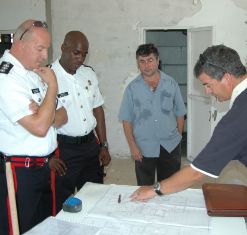
Brac cops go home to new station
 (CNS): Following the severe damage sustained during Hurricane Paloma in November 2008, the Cayman Brac Police Station has finally opened its doors to the public today, Wednesday 27 January, after an extensive refurbishment programme. As a result of the damage to the station, in the aftermath of the hurricane the police moved their Brac operations to a temporary location within the UCCI campus. Chief Inspector Malcolm Kay said that while he was grateful to the college he was happy to be going back to the Creek.
(CNS): Following the severe damage sustained during Hurricane Paloma in November 2008, the Cayman Brac Police Station has finally opened its doors to the public today, Wednesday 27 January, after an extensive refurbishment programme. As a result of the damage to the station, in the aftermath of the hurricane the police moved their Brac operations to a temporary location within the UCCI campus. Chief Inspector Malcolm Kay said that while he was grateful to the college he was happy to be going back to the Creek.
The new look facility now measures 1650 square feet and will accommodate police and administrative staff functions for Cayman Brac. The office has a new suite of police cells and is equipped with hurricane shutters and impact glass.
“While we are extremely grateful to the UCCI for allowing us to set up a temporary police station within their campus, I’m sure I speak on behalf of all of my staff when I say we are glad to be going ‘home’," said CI Kay, area commander on the Brac. “The new facility is fantastic and I’m sure the communities of Cayman Brac will agree it’s a complex which is fit for 21st century policing on the island. We are in the process of organising a formal open day to thank our communities, UCCI, the wider RCIPS family and the portfolio for their support during the renovations and we will publish details of those arrangements in due course.”
However, the senior officer noted that, in the meantime, it was important for the residents and those visiting to know how they can contact the police.
“Our Cayman Brac contact numbers will stay the same – but if you need to come into the police station to speak to an officer or to complete administrative business, please remember to come to the new look police station at Creek and not UCCI,” CI Kay added. Cayman Brac police station can be contacted on 948-0331.

Murder trial delayed
 (CNS): Issues of representation have again delayed the start of the trial of Kirkland Henry and Larry Ricketts for the murder of Estella Scott-Roberts. Although Solicitor General Cheryll Richards QC was expected to open the crown’s case against the two men this morning before Chief Justice Anthony Smellie in Grand Court one, the trial was once again postponed when the court was told that the recently appointed lead counsel for Ricketts had come off-record.
(CNS): Issues of representation have again delayed the start of the trial of Kirkland Henry and Larry Ricketts for the murder of Estella Scott-Roberts. Although Solicitor General Cheryll Richards QC was expected to open the crown’s case against the two men this morning before Chief Justice Anthony Smellie in Grand Court one, the trial was once again postponed when the court was told that the recently appointed lead counsel for Ricketts had come off-record.
Before a crowded court room, Gordon Aspden instructed by Priestleys explained that Lee Freeman, junior counsel for Ricketts, had been taken ill, and furthermore, lead counsel Delano St Aubyn Harrison QC had, for professional reasons, withdrawn from the case.
He said the application for his removal had been granted by Justice Charles Quin and Aspden told the court that fresh lead counsel was expected to arrive on island shortly. The attorney explained to the chief justice that the defence would be ready to represent Ricketts by Monday, 1 February, if the court was willing to adjourn the proceedings until then.
He did not provide the details of why Harrison had left the case but said he knew why. He also observed that he was well aware that it was fifteen months since the defendants were charged with the crime and remanded in custody. As a result, Aspden assured the court that everything was being done to ensure the defence would be prepared for trial next week.
Ian MacLean Bourne QC, who is appearing as lead counsel for Henry, said that while he believed Aspden was more than capable of taking the case without lead counsel, he was willing to agree to the application provided the trial did go ahead on Monday, 1 February. He told the court that his client had also been on remand for more than fifteen months and was anxious to have the trial go ahead.
The chief justice said he understood the difficulties faced by Aspden and that the law required “equality of arms”. He was therefore willing to grant the application and adjourn the trial till 1 February as arrangements had been made for lead counsel to take the case. He also agreed to do what he could to help expedite the necessary work permit for the new QC.
Since the arrest of the two Jamaican nationals two weeks after the body of Scott-Roberts was discovered in her own burnt out car in the Barkers area of West Bay, Ricketts has been plagued with representation issues, with a number of counsel going on and off record for the defendant. Harrison arrived on island to begin work on the case just a few days ago and was scheduled to have been sworn in at the Cayman Island Bar yesterday but instead cited professional reasons to discontinue.

Bank reform focus of Davos
 (BBC): Disputes over how best to reform the global financial system are set to dominate this year’s World Economic Forum in Davos. French President Nicolas Sarkozy is likely to add to the pressure on banks in a keynote speech on Wednesday. Numerous sessions on banking reform are expected to see clashes between bankers and regulators. The forum, meanwhile, is publishing a report on how to redesign the "global financial architecture". Last year, after the crisis struck,bankers stayed away, firefighting the crisis at home. This year the bankers are back, but the talk is of reform and restructuring, with politicians, regulators and central bankers setting the framework for discussions.
(BBC): Disputes over how best to reform the global financial system are set to dominate this year’s World Economic Forum in Davos. French President Nicolas Sarkozy is likely to add to the pressure on banks in a keynote speech on Wednesday. Numerous sessions on banking reform are expected to see clashes between bankers and regulators. The forum, meanwhile, is publishing a report on how to redesign the "global financial architecture". Last year, after the crisis struck,bankers stayed away, firefighting the crisis at home. This year the bankers are back, but the talk is of reform and restructuring, with politicians, regulators and central bankers setting the framework for discussions.
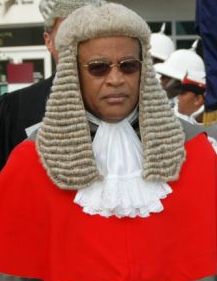
CJ to try Estella’s accused
 (CNS): The long awaited trial of Kirkland Henry and Larry Ricketts for the murder of Estella Scott Roberts will open this morning (Wednesday 27 January) in the Grand Court before Chief Justice Anthony Smellie. As they have opted for a judge alone trial and foregone their right to a jury, Solicitor General Cheryll Richards QC is expected to open the case against the two Jamaican nationals at 10:00am before the country’s top judge. The men, who have pleaded not guilty to the offence of murder, were arrested just over two weeks after the discovery of Scott-Roberts’ body in her own burnt out car in the Barkers area of West Bay on Saturday, 11 October 2008.
(CNS): The long awaited trial of Kirkland Henry and Larry Ricketts for the murder of Estella Scott Roberts will open this morning (Wednesday 27 January) in the Grand Court before Chief Justice Anthony Smellie. As they have opted for a judge alone trial and foregone their right to a jury, Solicitor General Cheryll Richards QC is expected to open the case against the two Jamaican nationals at 10:00am before the country’s top judge. The men, who have pleaded not guilty to the offence of murder, were arrested just over two weeks after the discovery of Scott-Roberts’ body in her own burnt out car in the Barkers area of West Bay on Saturday, 11 October 2008.
Scott-Roberts was a well-known local community activist who had campaigned tirelessly to address the violence against women in the local community and had worked as the director of the Crisis Centre for many years before taking up an executive position with Cable and Wireless. The news of her murder sent shock waves of disbelief through the community.
On remand at Northward Prison for the last fifteen months awaiting trial, the two accused men had faced considerable difficulties regarding their legal representation. While Ben Tonner of Samson McGrath went on record for Henry at an early point in the case, he faced difficulties in obtaining a legal aid certificate for an overseas QC, which has since been resolved. Ricketts, however, was without any representation for some time, delaying the trial, which had been scheduled for last August. Eventually Lee Freeman of Priestley’s went on record and has since managed to secure senior counsel for his client.
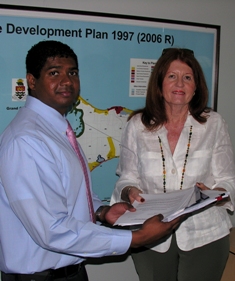
Over one thousand people object to Emerald Sound
 (CNS): Berna Cummins, who has been spearheading the opposition to the proposed Emerald Sound development in South Sound, handed over a petition of more than 1,100 signatures of people objecting to it to the Planning Department. The signatures came from both those people living within the 1500 foot radius, which the department is obligated to consider, as well as others living in the wider neighbourhood and the wider community who are concerned about the environmental impact and the precedent it could set. Haroon Pandohie, the acting director, received the petition.
(CNS): Berna Cummins, who has been spearheading the opposition to the proposed Emerald Sound development in South Sound, handed over a petition of more than 1,100 signatures of people objecting to it to the Planning Department. The signatures came from both those people living within the 1500 foot radius, which the department is obligated to consider, as well as others living in the wider neighbourhood and the wider community who are concerned about the environmental impact and the precedent it could set. Haroon Pandohie, the acting director, received the petition.
The main objection to the development has focused on the intention of the developer to constructa channel through the current South Sound Road from the ocean through to the main site of the proposed development by Bel Air Drive.
The meeting to consider the application made by RS Estates is likely to take place before the end of January, and Cummins and the others opposing the development hope the petition will back up the objections made by those living in the immediate vicinity and stop what many people think is a dangerous proposal.
Cummins said recently that the development poses a threat to the entire Cayman Islands and not just those living close by, as she and others believe this development could open the flood gates (literally) for similar projects. “I have not spoken to one individual other than Burns Conolly that is in favour of this planning application,” Cummins told CNS.
During a recent public meeting about the development a number of Cayman’s most experienced mariners voiced their opposition as they said it was a dangerous idea to cut a channel through the road. Burns Conolly, who is the architect on the particular project, said that all precautions have been taken in addressing the previous complaints associated with this development and the main complaints about potential drainage problems.
Anyone who wishes to follow and offer support to the campaign to stop the project can contact Berna Cummins berna@candw.ky
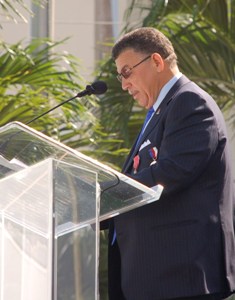
Bush tells Caymanians to go back to church
 (CNS): Following what he said was a decline in church membership and attendance, the premier has said that the only churches which are now filled to capacity are those predominantly of non-Caymanian origin and he has asked why Caymanians are not gathering to worship. Speaking at the Heroes’ Day celebrations, which this year focused on the Cayman Islands’ Christian heritage, McKeeva Bush said the community needed to revive it and a wider commitment to community service for more than just religious reasons. Bush said that the country’s churches had provided much of society’s support and suggested that working for others through the church was an important part of human development.
(CNS): Following what he said was a decline in church membership and attendance, the premier has said that the only churches which are now filled to capacity are those predominantly of non-Caymanian origin and he has asked why Caymanians are not gathering to worship. Speaking at the Heroes’ Day celebrations, which this year focused on the Cayman Islands’ Christian heritage, McKeeva Bush said the community needed to revive it and a wider commitment to community service for more than just religious reasons. Bush said that the country’s churches had provided much of society’s support and suggested that working for others through the church was an important part of human development.
“Academics who study how communities and societies function agree that community service increases a person’s sense of belonging and hence their social capital — that is, the connections with a wider group which have a mutually accepted value. It has been argued – most recently here by the researchers who compiled our National Assessment of Living Conditions (NALC)– that in the Cayman Islands the less fortunate members of our society are rapidly losing access to such social capital,” Bush said.
“Let’s start the new decade here. Let’s get back to church and be a part of a real uplift of the community.”
He also encouraged parents to put their children in church and Sunday school in an environment where they are taught ethics, and how to make moral choices from a young age.
“We should all, as the Bible says, ‘train up our children in the way that they should go, and when they are old they will not depart from it’. This is especially true where adults in that environment can live as good examples,” the premier said. “There can be no better grounding for a child than what they learn in Sunday school.’
He said that as the premier — and minister responsible for the soon to be forthcoming National Planning Initiative – government is committed to doing everything it can to provide other essential forms of support that will help to improve the life chances of our people today.
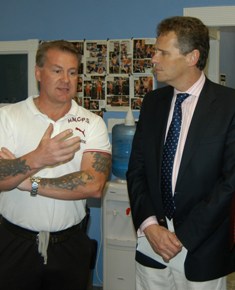
New governor taken to Northward Prison
 (CNS): Continuing on his mission to get to know the local community and government services, in particular his areas of responsibility, the new governor, Duncan Taylor, got his first glimpse of the problems and issues at Northward men’s prison last Thursday. Just days before inmate Randy Martin was found guilty of murdering 21-year-old Sabrina Schirn while working at the prison farm, Taylor was shown the farming that is now taking place actually in the prison wall since Wilderness, the East End facility, was closed. Greeted by Director Dwight Scott, the governor received an overview of prison services and inspected a display illustrating different aspects of prison life.
(CNS): Continuing on his mission to get to know the local community and government services, in particular his areas of responsibility, the new governor, Duncan Taylor, got his first glimpse of the problems and issues at Northward men’s prison last Thursday. Just days before inmate Randy Martin was found guilty of murdering 21-year-old Sabrina Schirn while working at the prison farm, Taylor was shown the farming that is now taking place actually in the prison wall since Wilderness, the East End facility, was closed. Greeted by Director Dwight Scott, the governor received an overview of prison services and inspected a display illustrating different aspects of prison life.
Taylor had a full tour of the facility, including cell blocks, the chapel, the holding area, the computer training room, the psychology unit, the visitor’s area and the gym. He was also shown the woodwork service, and the literacy and psychology programmes.
Despite Cayman’s exceptionally high recidivism and illiteracy rates, according to a GIS release, Taylor said he was impressed by the rehabilitative initiatives he saw at the prison. “I am a firm believer in rehabilitation; the more exposure inmates have to education and training programmes, the greater their chances of getting on a better life path,” he said. “It was also very important for me to gain an idea of operations here as this is one of my key areas of responsibility. This was an introductory visit and obviously I will back in future for more detailed visits and discussions.”
HMP Northward falls under the Portfolio of Internal and External Affairs, for which the governor has direct responsibility. Following the prison visit, Taylor was met by his wife, Marie-Beatrice, and son, Max, who accompanied him on a tour of the Bodden Town district.
The governor’s next public appearance will be at a reception in West Bay, where Premier McKeeva Bush is inviting all West Bay residents to welcome him on Wednesday, 27 January, at Boatswain’s Beach at 5:00pm.
Subs return only 1st step
(CNS): The return of three sub-contractors to the two school projects is just the first step towards getting them back on track and getting the once hundreds of workers back on site. It could take several weeks to get the full complement of people back to the John Gray Campus and the Clifton Hunter site, contractors have said, in the wake of the Education Ministry’s announcement that the work has recommenced. The ministry told CNS that Precision Roofing, IE Caribbean and Caribbean Mechanical will have staff on the site from 7:00am Wednesday morning, but admits it will take some time before the projects are back to full capacity. (Left Alan Roffey returns to the John Gray Campus)
Alan Roffey of Caribbean Mechanical said that around twenty to thirty people would be returning to work over the next few days and there would be a gradual ramping up of staff at both of the worksites, but it would be several weeks before the hundreds of construction workers once employed by the school project would all be back on the job. “It is a gradual process as there are a great number of things that need to be dealt with as we work towards returning to full capacity and re-employing all of the workers,” he added.
The minister said today was an important first step towards the full recommencement of the new schools projects. Education Minster Rolston Anglin told CNS via email that there were a number of problems created by the abandonment by the original contractor, Tom Jones International, in November of last year, but the ministry had worked hard to find a solution to the problem created by the dispute.
“Since the contractor abandoned the school’s projects, much work has gone on behind the scenes by the ministry’s Project Management team, led by David Benoit. The role of the project management team has been to fully investigate the best options for how we should proceed, to get the work completed in a timely manner, while protecting the interests of the government and the people of the Cayman Islands,” he said.
He explained that today’s announcement focuses on the first phase of work that the project team has identified as urgent, to prevent deterioration and preserve warranties in an effort to mitigate costs going forward. When the general contractor demobilized, it removed key construction equipment and directed the sub-contractors to also remove materials, tools and equipment from the project sites.
“In the normal course of recommencing work, necessary equipment and materials must be redelivered to support construction activities,” the ministry explained, adding that during the day on Tuesday sub-contractors worked on returning equipment in order to allow work crews to begin early Wednesday morning.
The former site supervisors from the project’s architect have now been placed on each project and three sub-contractors have returned. The work on roofing installations will be handled by Precision Roofing, works related to exterior wall systems will be performed by IE Caribbean, and Caribbean Mechanical will be executing the mechanical and electrical works needed. The ministry explained that this initial work would be followed by a full-scale recommencement of the projects under the supervision of a construction manager, who will be responsible for the day-to-day construction activities at both sites. The ministry said opportunities for qualified companies to bid to provide those construction management services would be offered soon.
While a general contractor would normally engage in both construction work as well as overall supervision of sub-contractors, a construction management firm will simply be expected to manage the pool of sub-contractors working on the two sites and liaise with the government’s own project manager.

Rapist spared, victim lashed
 (The Daily Star): Eight months after being raped, a 16-year-old in Bangladesh was given 101 lashes as "punishment". A village arbitration found her guilty and issued the 101 lashes fatwa (religious edict) but amazingly left alleged rapist Enamul Mia, 20, untouched. The arbitration also fined the victim’s father Tk 1,000 and issued another fatwa that her family would be forced into isolation if he failed to pay up. Village matbar (local leader) Delwar Hossain alias Ullashi executed the durra (lashes) on January 17. Family sources said Enamul Mia of Gabbari used to eve-tease the girl on her way to school. He raped her April last year. Fearing the shame, the girl did not disclose the incident.
(The Daily Star): Eight months after being raped, a 16-year-old in Bangladesh was given 101 lashes as "punishment". A village arbitration found her guilty and issued the 101 lashes fatwa (religious edict) but amazingly left alleged rapist Enamul Mia, 20, untouched. The arbitration also fined the victim’s father Tk 1,000 and issued another fatwa that her family would be forced into isolation if he failed to pay up. Village matbar (local leader) Delwar Hossain alias Ullashi executed the durra (lashes) on January 17. Family sources said Enamul Mia of Gabbari used to eve-tease the girl on her way to school. He raped her April last year. Fearing the shame, the girl did not disclose the incident.

Decommissioning Human Rights in Cayman
The Human Rights Commission (which replaces the former Human Rights Committee) was established under section 116 of the new Constitution with a mandate of “promoting understanding and observance of human rights in the Cayman Islands.” However, the reputation of the Commission has been brought into question with the recent appointment of members who have a poor track record in the promotion and protection of equal rights for all.
While the new Commission continues to include members who have an unquestionable commitment to human rights, one (and arguably two) recently appointed member(s), Reverend Sykes, has on several occasions and over a period of many years acted and preached towards the exclusion of certain minority groups. By way of example, in 2001 when Cayman laws banning homosexuality were finally abolished, Reverend Sykes complained that this was ‘totally unacceptable’ and stated that such a move would lead to the mandatory inclusion of detailed acts of homosexuality in schools. The fact that this hasn’t happened has done nothing to dampen Reverend Syke’s crusade.
Reverend Sykes’ claims to defend a fundamental moral and biblical stance is little more than a matter of his own personal opinion. Many Christians argue that marriage rights for same-sex couples strengthens the institution of marriage and provides legal protection for partners as well as children of this family unit. The Archbishop of Canterbury has stated that “active homosexual relationships are comparable to marriage" in the eyes of God. South Africa’s Archbishop Desmond Tutu has said that homophobia is a "crime against humanity" and "every bit as unjust" as apartheid.
Same-sex marriages are, according to many Christians, supportive of religions’ commitment to the equality and dignity of all persons.
But while religion’s stance on homosexuality may be a matter for interpretation, human rights law is without ambiguity. The universal declaration of human rights is founded on the principle that all human beings are equal in dignity and rights. The abolition of Cayman’s anti-gay laws was based on the fact that they were a violation of international human rights law.
This issue goes beyond the Cayman Islands. Caymanians on the whole enjoy the highest standard of living in the Caribbean, and has considerable influence in the region. A message ofintolerance here, particularly by members of the Human Rights Commission, can be translated into much worse in neighbouring countries. In Jamaica, Amnesty International has documented many cases of gay men and lesbian women being beaten, burned, raped and shot because of their sexuality. Sadly, we have increasingly seen signs of this in Cayman also. Reverend Sykes might not endorse such violence, but his public view that homosexuals do not have equal rights does little to help.
Reverend Sykes’ lack of tolerance of minorities may be viewed as inconsistent with his role as a religious leader; however I would argue that it is utterly and undeniably incompatible with his role on the Human Rights Commission whose primary responsibility is to promote understanding and observance of human rights in Cayman.
The Human Rights Commission is essential to upholding the basic freedoms that human rights provide: the equal treatment of all human beings regardless of the colour of their skin, their age, their socio-economic background, their sexual orientation or other forms of discrimination. To ensure that this important work continues, the Government which appoints members of the Commission should insist that Reverend Sykes publicly renounces his previous convictions, or replace him with someone whose views are not in conflict with the basic principles the Commission is established to uphold. Human rights are, before all else, an affirmation of our shared humanity. Any threats to the basic freedoms that flow from this principle are not a concern for minority groups alone. They affect all of us.
Danielle Coleman served as a member of the former Human Rights Committee from 2006-2009.